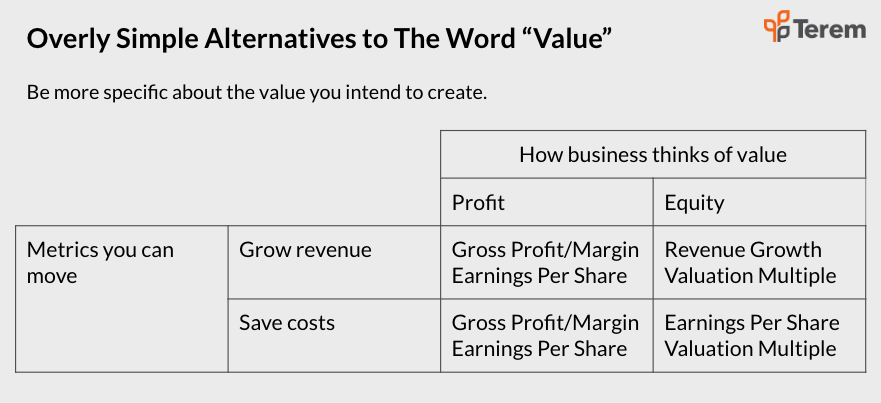
Value is a term that gets used a lot. Leaders are defined by the value they create. Team members want to be valuable. Job candidates stress the value they can bring. But the word value isn’t clear enough to be useful on its own.
To create real value you need to stop using the word value so you can be more accurate in defining the value you will create. Value is an interesting concept in that way.
The reason for this is that value means different things to different people and different organisations.
If you step away from business for a moment and into your personal life then it’s easy to understand the problem. I might value water sports while you might value hiking. There isn’t a right hobby or a wrong hobby, just different ways to value your time.
In the book ‘Zen and the Art of Motorcycle Maintenance’, Pirsig philosophically contemplates quality, which for our purposes is similar to contemplating value. Pirsig’s story compares two people The narrator values his older motorcycle, its inner workings, and being able to repair it. His friend values his brand new, prestigious BMW motorcycle but is unable to repair it and is uninterested in its workings. Both go on the same journey together, but their experiences are determined by their systems of value.
Thinking about value in business
In business, there are a variety of different definitions, explanations and approaches to value and value creation. For example:
- Value Investing. Renowned investor Warren Buffet is famous for this style of investing, which is picking businesses or stocks that are trading for less than their intrinsic value. That is, businesses with a share price that is below the price determined by some method of fundamental analysis.
- McKinsey’s book Valuation: Measuring and Managing the Value of Companies provides some useful, if overly complex at times, approaches and methodologies for defining value and improving it.
In the land of software development, product management, and agile:
- The Scaled Agile Framework (SAFE) uses Value Streams that are intended to “represent the series of steps that an organisation uses to implement Solutions that provide a continuous flow of value to a customer.”
- Pirate Metrics, viewed through the lens of value, is a framework for bringing clarity to teams so they can focus on the metrics that ultimately create value for a business.
- OKRs, championed by Google and John Doerr of outperforming VC Kleiner Perkins, are another approach to defining how value is created and how people can contribute.
- Raw efficiency is often an approach to value creation. If we spend X to automate task T, then we will save Y over the coming Z months/years doing task T.
Simplifying value
Ultimately though, these approaches to value creation can (and often should) be simplified further to be about making or saving money.
Something about the way we like to interact and talk in business tends to obscure this underlying foundation of value creation. Here is an overly simplified way of being more specific about the value you will create:

Value in practice
In practice, creating value is simple about being clear on how your business defines it. This is actually harder than it sounds, especially in larger organisations. But it’s getting to this clarity and simplicity that allows you to genuinely unlock value.
I haven’t covered value and value creation in relation to people and culture. This is a topic for another day.
Additional reading:
- ‘Zen and the Art of Motorcycle Maintenance’ by Robert M. Prisig
- ‘The Intelligent Investor’ by Benjamin Graham, recommended by Warren Buffet.
- ‘Valuation: Measuring and Managing the Value of Companies’ from McKinsey.

Scott Middleton
CEO & Founder
Scott has been involved in the launch and growth of 61+ products and has published over 120 articles and videos that have been viewed over 120,000 times. Terem’s product development and strategy arm, builds and takes clients tech products to market, while the joint venture arm focuses on building tech spinouts in partnership with market leaders.
Twitter: @scottmiddleton
LinkedIn: linkedin.com/in/scottmiddleton